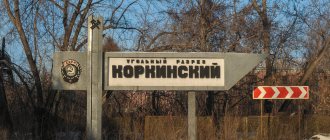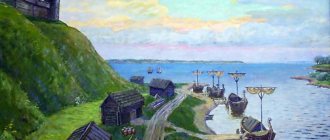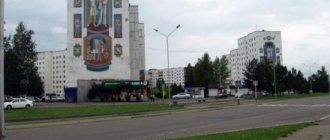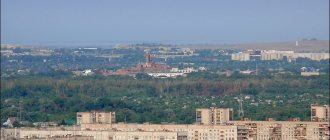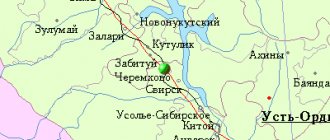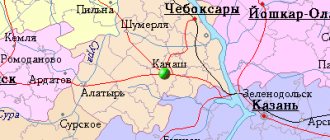| Shebekino City Flag | Coat of arms |
| A country | Russia, Russia |
| Subject of the federation | Belgorod regionBelgorod region |
| Municipal district | Shebekinsky |
| urban settlement | Shebekino city |
| Coordinates | 50°24′28″ n. w. 36°53′49″ E. long / 50.40778° north w. 36.89694° E. d. / 50.40778; 36.89694 (G) [www.openstreetmap.org/?mlat=50.40778&mlon=36.89694&zoom=12 (O)] (Z)Coordinates: 50°24′28″ N. w. 36°53′49″ E. long / 50.40778° north w. 36.89694° E. d. / 50.40778; 36.89694 (G) [www.openstreetmap.org/?mlat=50.40778&mlon=36.89694&zoom=12 (O)] (I) |
| Chapter | Kirichenko, Artyom Alexandrovich |
| Based | in 1713 |
| First mention | 1713 |
| City with | 1938 |
| Square | 41 km² |
| Center height | 110 |
| Population | ↘42,903[1] people (2016) |
| Density | 1046.41 people/km² |
| National composition | Russians, Ukrainians, Belarusians and others |
| Confessional composition | Orthodox and other denominations |
| Names of residents | Shebekin people, Shebekin, Shebekin |
| Timezone | UTC+3 |
| Telephone code | +7 47248 |
| Postcode | 309290 |
| Vehicle code | 31 |
| OKATO code | [classif.spb.ru/classificators/view/okt.php?st=A&kr=1&kod=14450 14 450] |
| Shebekino Moscow |
| Belgorod Shebekino |
K: Settlements founded in 1713
Shebekino
- a city in the Belgorod region of Russia, the administrative center of the Shebekinsky district, forms
the urban settlement "Shebekino City"
.
Story
The date of origin of the Shebekino settlement is considered to be 1713, when it was first marked on Russian maps. However, it is likely that there was some kind of small settlement in this place before, which arose in the 17th century during the colonization of these territories by Russian people. Moreover, the Belgorod defensive line passed very close to this place and one of its guards was located. In 1654, on the site of a suburb of modern Shebekino, the fortress city of Nezhegolsk was built, which was part of the Belgorod defensive line [2] [3].
The settlement received its name from the surname of the first landowner, who, having settled his serfs here, founded the village. Lieutenant Colonel Ivan Dmitrievich Shebeko, who was one of the participants in the Battle of Poltava, bought 160 quarters of land from the nobleman N. R. Maslov. He settled his serfs on the right bank of the Nezhegol River. On his estate, in addition to the estate, he also built a mill[3].
In 1716, I.D. Shebeko and his wife died without leaving children. The entire estate passed into rental ownership to Alexei Vasilyevich Makarov, the former cabinet secretary of Peter I[3]. After his death, Shebekino became the object of disputes among landowners and in the 18th century it was replaced by several landowners[3], among whom N.F. Golovin was famous[2]. In 1785, the Shebekino settlement came into the possession of Princess Ekaterina Petrovna Baryatinskaya[3]. In the center of the settlement in 1792, “at the expense of parishioners and willing donors,” the wooden Church of the Tikhvin Mother of God was built.
From October 20 (Old Style) 1721 to September 1 (Old Style) 1917 as part of the Russian Empire.
In the 19th century, the settlement became the volost center of the Belgorod district of the Kursk province[2]. In 1836, the Shebekino settlement was bought by Lieutenant General Alexei Maksimovich Rebinder (1795-1869). With the transfer of ownership to the Rebinder family, the active development of industry began in the settlement. In 1839, the owner of the settlement built a primitive sugar factory on the banks of the Nezhegol River, which in 1848 was reconstructed and enlarged and named after the owner Alekseevsky
[4]. In 1847, a brick factory was built, which was intended to provide the enterprise with building materials. By 1850, the Rebinder beet sugar factory became one of the largest in the Kursk province[3].
The son of Alexei Maksimovich, Alexander[4], in 1867 built mechanical workshops for repairing agricultural equipment in Shebekino, and in 1875 - a distillery and a two-story mill with a churn. In 1888, the sugar factory was reconstructed, the main and two side buildings were completed, and a water pump was installed. In 1890, the Shebekinsky and Novo-Tavolzhansky sugar factories produced products worth 1 million 575 thousand rubles. To simplify the export of such volumes of products, in 1896, during the construction of the railway line from Belgorod to Kupyansk, access railway tracks were laid from the Nezhegol station to the Botkino freight station in Novo-Tavolzhanka and to the Rebinderovo freight station in the Shebekino settlement[3].
In 1875, Alexander Alekseevich, together with his brother Nikolai, on the initiative of agronomist Vasily Krainsky[5], founded the Maryinsk Agricultural School in Shebekino for workers for 120 people. It accepted pupils no younger than 14 years old, who were trained by 3 teachers in field work, carpentry and plumbing[3].
At the turn of the 1880s, a new stone church with the same name was built next to the old church. Part of the funds for its construction was allocated by the Rebinder family.
In 1905, A. A. Rebinder built a power plant at the sugar factory, which provided electricity not only to industrial enterprises, but also to residential buildings. At the beginning of the 20th century, the Alekseevsky plant became the largest in Russia, and the daily production of sugar amounted to 15 cars of 900 poods each, which gave an income of up to 3 million rubles per year. In 1914, A. Rehbinder built a tannery and slaughterhouse, which employed 1,385 workers[3].
Before the revolution in Shebekino, in addition to sugar and leather factories, there were alcohol, chalk and brick factories, as well as agricultural workshops[3].
In the Fedorovka economy there was a stud farm (stud farm). To breed more hardy breeds of horses, A. A. Rebinder bought several stud stallions abroad.
From September 1 (old style) to October 25 (old style) 1917 as part of the Russian Republic. Then the Russian Civil War of 1918-1923 began.
Since December 1922, as part of the RSFSR.
In July 1928, Shebekino became the center of the district. On December 16, 1938, by the Decree of the Supreme Council of the RSFSR, the workers' village of Shebekino was given the status of a city[6].
It was occupied by the Germans on June 14, 1942[7], liberated on February 9, 1943 by the 472nd Regiment (commander - Major Semyon Petrovich Berezin) with the assistance of the 454th and 460th Infantry Regiments of the 100th Infantry Division (Major General Perkhorovich, Franz Iosifovich) of the 40th Army of the Voronezh Front from Nazi German troops during the Kharkov offensive operation (see also Kharkov offensive operation 02.02.-03.03.1943)[7][8].
In the post-war period, Shebekino developed as a city of chemists. In 1948, construction began on a chemical plant producing fat substitutes and detergents based on surfactants. In the USSR, washing powders “Novost”, “Crystal”, “Neptune” were widely known, and liquid detergents “Fairy”, “Alfiya”, “Iva” were produced.
In 1961, the village of Titovka was included in the city limits; in 1971, the villages of Ustinka and Logovoye were included in the Shebekino area[9].
On December 20, 2004, in accordance with the Law of the Belgorod Region No. 159[10], the urban settlement “Shebekino City” was formed as part of the municipal formation “Shebekinsky District and the City of Shebekino”.
Shebekino
(Belgorod region)
OKATO code:
14450
Founded:
1713
City since:
1938 City of regional subordination
Center:
Shebekinsky district
Urban-type settlements, population as of 01/1/2021
| Maslova Pier | 6.0 |
| Telephone code (reference phone) | |
| 47248***** | 42-2-22 |
Deviation from Moscow time, hours:
0
Geographic latitude:
50°25′
Geographic longitude:
36°54′
Altitude above sea level, meters:
110 Sunrise and sunset times in the city of Shebekino
Economy
| : Incorrect or missing image | This section is missing references to information sources. Information must be verifiable, otherwise it may be questioned and deleted. You may edit this article to include links to authoritative sources. This mark is set April 27, 2016 . |
K:Wikipedia:Articles without sources (type: not specified)
- Household chemicals plant.
- Machine-building plant.
- Automotive special equipment plant.
- Factory of reinforced concrete products.
- JSC "Carbon", former chalk plant.
- Finishing materials plant.
- Construction materials plant.
- Vegetable plant.
- .
- Butter factory.
- Asphalt plant.
- Shebekinskoe pasta and confectionery production
- SPF RUS LLC
- LLC "Shebekinskie korma"
Literature
- Red Banner Kyiv. Essays on the history of the Red Banner Kyiv Military District (1919-1979). Second edition, corrected and expanded. - Kyiv: publishing house of political literature of Ukraine, 1979.
- Military encyclopedic dictionary. - M.: Military Publishing House, 1984.
- Directory "Liberation of Cities: A Guide to the Liberation of Cities during the Great Patriotic War of 1941-1945." M. L. Dudarenko, Yu. G. Perechnev, V. T. Eliseev and others - M.: Voenizdat, 1985. 598 p.
- Ovchinnikov V.V.
[ashkalov.ru/shebekino.html Shebekino] // Belgorod Encyclopedia / Ch. editor V.V. Ovchinnikov. - Belgorod: Regional Printing House, 1998. - P. 338. - ISBN 5-86295-001-X.
How to get there
- By car from Moscow, 700 km along the M-2 “Crimea” highway, in ten and a half hours. The second option is to take the M-4 Don toll highway to Yelets. Then drive through the city and head towards the P-298 highway. Then turn right and drive until the turn to the village of Tim, Kursk region. Pass the town of Korochu and go straight to your destination. This route is more difficult than the first. Therefore, it is better to use a navigator. Travel time is an hour less than in the first case.
- By bus Belgorod - Shebekino in one hour.
- By suburban electric train No. 6107, daily at 07:40 from Belgorod to Nezhegol station.
An excerpt characterizing Shebekino
A joyful feeling of freedom - that complete, inalienable, inherent freedom of man, the consciousness of which he first experienced at his first rest stop, when leaving Moscow, filled Pierre's soul during his recovery. He was surprised that this internal freedom, independent of external circumstances, now seemed to be abundantly, luxuriously furnished with external freedom. He was alone in a strange city, without acquaintances. Nobody demanded anything from him; they didn’t send him anywhere. He had everything he wanted; The thought of his wife that had always tormented him before was no longer there, since she no longer existed. - Oh, how good! How nice! - he said to himself when they brought him a cleanly set table with fragrant broth, or when he lay down on a soft, clean bed at night, or when he remembered that his wife and the French were no more. - Oh, how good, how nice! - And out of old habit, he asked himself: well, then what? What will i do? And immediately he answered himself: nothing. I will live. Oh, how nice! The very thing that tormented him before, what he was constantly looking for, the purpose of life, now did not exist for him. It was no coincidence that this sought-after goal of life did not exist for him at the present moment, but he felt that it did not and could not exist. And it was this lack of purpose that gave him that complete, joyful consciousness of freedom, which at that time constituted his happiness. He could not have a goal, because he now had faith - not faith in some rules, or words, or thoughts, but faith in a living, always felt God. Previously, he sought it for the purposes that he set for himself. This search for a goal was only a search for God; and suddenly he learned in his captivity, not in words, not by reasoning, but by direct feeling, what his nanny had told him long ago: that God is here, here, everywhere. In captivity, he learned that God in Karataev is greater, infinite and incomprehensible than in the Architect of the universe recognized by the Freemasons. He experienced the feeling of a man who had found what he was looking for under his feet, while he strained his eyesight, looking far away from himself. All his life he had been looking somewhere, over the heads of the people around him, but he should have not strained his eyes, but only looked in front of him. He had not been able to see before the great, incomprehensible and infinite in anything. He just felt that it must be somewhere and looked for it. In everything close and understandable, he saw something limited, petty, everyday, meaningless. He armed himself with a mental telescope and looked into the distance, to where this small, everyday thing, hiding in the fog of the distance, seemed great and endless to him only because it was not clearly visible. This is how he imagined European life, politics, Freemasonry, philosophy, philanthropy. But even then, in those moments that he considered his weakness, his mind penetrated into this distance, and there he saw the same petty, everyday, meaningless things. Now he had learned to see the great, the eternal and the infinite in everything, and therefore naturally, in order to see it, to enjoy its contemplation, he threw down the pipe into which he had been looking until now through the heads of people, and joyfully contemplated the ever-changing, ever-great world around him. , incomprehensible and endless life. And the closer he looked, the more calm and happy he was. Previously, the terrible question that destroyed all his mental structures was: why? did not exist for him now. Now to this question - why? a simple answer was always ready in his soul: because there is a God, that God, without whose will a hair will not fall from a man’s head. Pierre has hardly changed in his external techniques. He looked exactly the same as he had been before. Just as before, he was distracted and seemed preoccupied not with what was in front of his eyes, but with something special of his own. The difference between his previous and present state was that before, when he forgot what was in front of him, what was said to him, he, wrinkling his forehead in pain, seemed to be trying and could not see something far away from him . Now he also forgot what was said to him and what was in front of him; but now, with a barely noticeable, seemingly mocking, smile, he peered at what was in front of him, listened to what was being said to him, although obviously he saw and heard something completely different. Before, although he seemed to be a kind person, he was unhappy; and therefore people involuntarily moved away from him. Now a smile of the joy of life constantly played around his mouth, and his eyes shone with concern for people - the question: are they as happy as he is? And people were pleased in his presence. Before, he talked a lot, got excited when he spoke, and listened little; Now he rarely got carried away in conversation and knew how to listen so that people willingly told him their most intimate secrets. The princess, who had never loved Pierre and had a particularly hostile feeling towards him since, after the death of the old count, she felt obliged to Pierre, to her chagrin and surprise, after a short stay in Orel, where she came with the intention of proving to Pierre that, Despite his ingratitude, she considers it her duty to follow him; the princess soon felt that she loved him. Pierre did nothing to ingratiate himself with the princess. He just looked at her with curiosity. Previously, the princess felt that in his gaze at her there was indifference and mockery, and she, as before other people, shrank before him and showed only her fighting side of life; now, on the contrary, she felt that he seemed to be digging into the most intimate aspects of her life; and she, at first with distrust, and then with gratitude, showed him the hidden good sides of her character. The most cunning person could not have more skillfully insinuated himself into the princess’s confidence, evoking her memories of the best time of her youth and showing sympathy for them. Meanwhile, Pierre’s whole cunning consisted only in the fact that he sought his own pleasure, evoking human feelings in the embittered, dry and proud princess. “Yes, he is a very, very kind person when he is under the influence not of bad people, but of people like me,” the princess said to herself. The change that took place in Pierre was noticed in their own way by his servants, Terenty and Vaska. They found that he had slept a lot. Terenty often, having undressed the master, with boots and dress in his hand, wishing him good night, hesitated to leave, waiting to see if the master would enter into conversation. And for the most part Pierre stopped Terenty, noticing that he wanted to talk. - Well, tell me... how did you get food for yourself? - he asked. And Terenty began a story about the Moscow ruin, about the late count, and stood for a long time with his dress, telling, and sometimes listening to, Pierre’s stories, and, with a pleasant consciousness of the master’s closeness to him and friendliness towards him, he went into the hallway. The doctor who treated Pierre and visited him every day, despite the fact that, according to the duties of doctors, he considered it his duty to look like a man whose every minute is precious for suffering humanity, sat for hours with Pierre, telling his favorite stories and observations on the morals of patients in general and especially ladies. “Yes, it’s nice to talk to such a person, not like here in the provinces,” he said. Several captured French officers lived in Orel, and the doctor brought one of them, a young Italian officer. This officer began to visit Pierre, and the princess laughed at the tender feelings that the Italian expressed towards Pierre. The Italian, apparently, was happy only when he could come to Pierre and talk and tell him about his past, about his home life, about his love and pour out his indignation at the French, and especially at Napoleon. “If all Russians are even a little like you,” he said to Pierre, “c’est un sacrilege que de faire la guerre a un peuple comme le votre.” [It is blasphemy to fight with a people like you.] You, who have suffered so much from the French, you don’t even have any malice against them. And Pierre now deserved the Italian’s passionate love only because he evoked in him the best sides of his soul and admired them. During the last period of Pierre's stay in Oryol, his old freemason acquaintance, Count Villarsky, came to see him, the same one who introduced him to the lodge in 1807. Villarsky was married to a rich Russian woman who had large estates in the Oryol province, and occupied a temporary position in the city in the food department. Having learned that Bezukhov was in Orel, Villarsky, although he had never been briefly acquainted with him, came to him with those statements of friendship and intimacy that people usually express to each other when meeting in the desert. Villarsky was bored in Orel and was happy to meet a person of the same circle as himself and with the same, as he believed, interests. But, to his surprise, Villarsky soon noticed that Pierre was very far behind real life and had fallen, as he himself defined Pierre, into apathy and selfishness. “Vous vous encroutez, mon cher,” he told him. Despite this, Villarsky was now more pleasant with Pierre than before, and he visited him every day. For Pierre, looking at Villarsky and listening to him now, it was strange and incredible to think that he himself had very recently been the same. Villarsky was married, a family man, busy with the affairs of his wife’s estate, his service, and his family. He believed that all these activities were a hindrance in life and that they were all despicable because they were aimed at the personal good of him and his family. Military, administrative, political, and Masonic considerations constantly absorbed his attention. And Pierre, without trying to change his view, without condemning him, with his now constantly quiet, joyful mockery, admired this strange phenomenon, so familiar to him. In his relations with Villarsky, with the princess, with the doctor, with all the people with whom he now met, Pierre had a new trait that earned him the favor of all people: this recognition of the ability of each person to think, feel and look at things in his own way; recognition of the impossibility of words to dissuade a person. This legitimate characteristic of every person, which previously worried and irritated Pierre, now formed the basis of the participation and interest that he took in people. The difference, sometimes the complete contradiction of people's views with their lives and with each other, pleased Pierre and aroused in him a mocking and gentle smile. In practical matters, Pierre suddenly now felt that he had a center of gravity that he did not have before. Previously, every money question, especially requests for money, to which he, as a very rich man, was subjected very often, led him into hopeless unrest and bewilderment. “To give or not to give?” - he asked himself. “I have it, but he needs it. But someone else needs it even more. Who needs it more? Or maybe both are deceivers? And from all these assumptions he had previously not found any way out and gave to everyone while he had something to give. He had been in exactly the same bewilderment before with every question concerning his condition, when one said that it was necessary to do this, and the other - another. Now, to his surprise, he found that in all these questions there were no more doubts and perplexities. A judge now appeared in him, according to some laws unknown to himself, deciding what was necessary and what should not be done. He was just as indifferent to money matters as before; but now he undoubtedly knew what he should do and what he should not do. The first application of this new judge for him was the request of a captured French colonel, who came to him, talked a lot about his exploits and in the end almost declared a demand that Pierre give him four thousand francs to send to his wife and children. Pierre refused him without the slightest difficulty or tension, marveling later at how simple and easy it was that which had previously seemed insurmountably difficult. At the same time, immediately refusing the colonel, he decided that it was necessary to use cunning in order to force the Italian officer, when leaving Orel, to take the money that he apparently needed. New proof for Pierre of his established view of practical matters was his solution to the issue of his wife’s debts and the renewal or non-renewal of Moscow houses and dachas.
